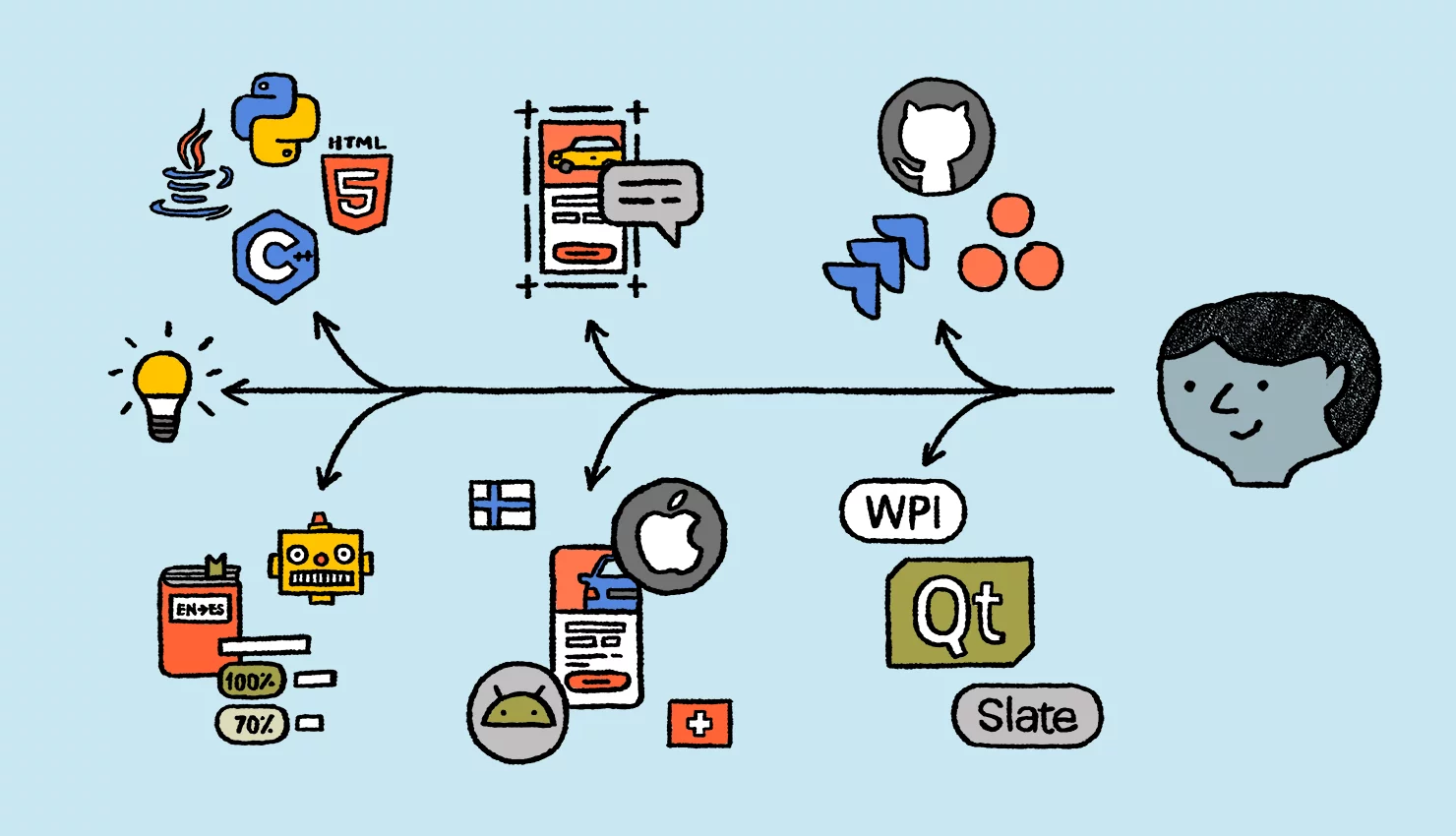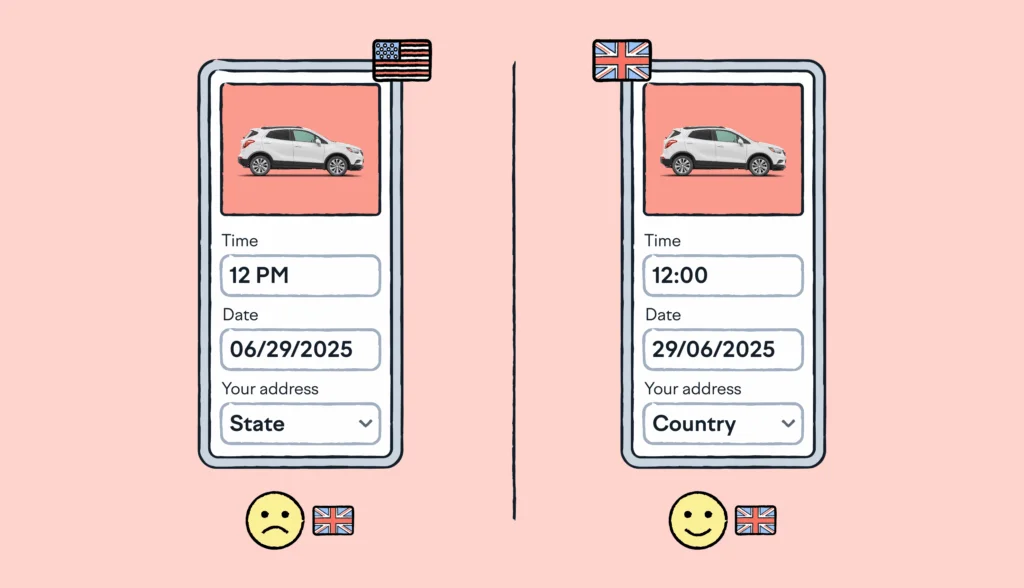Localization engineers take your localization processes and make sure they work like a well-oiled machine — all while balancing demands from across the business.
Ask project managers responsible for localization what’s needed for smooth international expansion, and they’ll tell you a localization engineer makes it all possible.
They facilitate the entire localization process and bridge the gaps between engineering, project managers, vendors, and linguists to make sure your product works seamlessly in every target language.
When done right, a localization engineer’s work hums in the background so you can rest assured that it all works, no matter where in the world someone uses your product.
What does a localization engineer do?
Here’s a simplified description: A localization engineer takes apart all the elements of a product that are to be localized and helps put them back together once localization is done.
So, what does that look like in practice?
In preparing for localization, the first step an l10n engineer takes is to check whether the product has been sufficiently internationalized to allow for localization. This process often integrates a translation management system to streamline workflows and ensure smooth localization efforts. This includes making sure your source code is stored in separate files, establishing best practices, and ensuring that the ‘localizability’ of the product is at a level that won’t cause problems down the road.
Let’s break this down by looking at the four main areas of localization they participate in:
- Internationalization (i18n): It’s important to note that localization engineers do not design and develop your software. However, they should collaborate closely with developers to ensure that what is being built can easily be localized.
- Localization (l10n): While developers execute the localization of your software or mobile application on a coding level, localization engineers deal with placeholders, tags, and other elements of code to make sure everything requiring translation is in the right place.
- File handling: Any localization effort involves multiple file formats and source files. Ideally, strings should be stored in resource files as opposed to living inside your code base. Localization engineers ensure that you’re using appropriate file formats for the programming language you use.
- Testing: They work directly with localization quality assurance (QA) testers to make sure the final product not only works but also makes sense in each target market.
Simply put, localization engineers have their hands in some of the most important back-end work. Let’s look at the specific set of skills they bring to the team.
The profile of a successful localization engineer
Here are the core technical skills you should look for in a successful localization engineer:
- Extensive knowledge of TMS and the paradigm it’s built on and any limitations of the given TMS
- Importing file filters/integrations with code repositories
- Proficiency in Translation memory (TM) matching, leverage, and segmentation
- Awareness of how restructuring localizable resources impact the leverage of legacy TM assets
- Knowledge of machine translation engines
- File formats used in localization and conversion techniques (regular expressions, PathQuery lang)
- Ability to write conversion/automation scripts (Python, Ruby, Perl, PowerShell)
- Strong analytical and problem-solving skills
- Ability to work effectively cross-functionally
- Ability to document and maintain technical instructions, guides, and best practices
But a job description only tells part of the story when it comes to executing detailed localization projects. What should you look for beyond these core skills and how can you hire the best localization engineer?
How to hire the best localization engineer
The first step to hiring any localization developer is their portfolio or web presence. In addition to their resume, you should be requesting their work from GitHub or their personal website so you can see their capabilities for yourself.
According to Glassdoor, localization engineers make, on average, $92,000 in the United States (this varies for other countries). Here’s what you’ll need to do to find the right fit:
Write a detailed job description
Your job description should be detailed, including an overview of your company, your team, and how this individual’s responsibilities fit into the larger localization and product workflow.
Note any specific development processes you already use, such as agile or continuous localization, and any relevant technology, such as your TMS tool, machine learning engines, and content management systems. Make sure to mention if you’re looking for niche experience (e.g., hands-on work with medical software localization). These are all important pieces of the puzzle when determining an engineer’s technical aptitude for the role.
Then include information about responsibilities, such as the requirements to:
- Design and implement technical improvements in the localization workflow.
- Execute localization requests from multiple stakeholders, including editing documents, web pages, product pages, and working with multiple files.
- Troubleshoot localization engineering issues as they arise.
- Communicate with cross-functional stakeholders on projects.
- Manage the translation management and/or vendor relationship, including a glossary, translation memory, and machine translation.
- Develop and implement standard operating procedures and automation opportunities.
- Test and implement new localization projects, track performance, and identify improvements.
- Stay up to date on the latest technological updates and recommend ways to improve the existing setup.
Don’t forget to include information about the skills, tools, and the process your team already works with, especially regarding the type of technical skills you’re looking for.
Every organization and technical setup is slightly different, so be sure to specify in your requirements: coding languages (such as, C/C++/Python, Java, XML, or HTML), mobile applications (like Android or iOS), and other needs like programmatic or algorithmic design, project management tools like GitHub or Asana, or UI toolkits like WPI, QT, or Slate.
In addition to the above-mentioned, you should let your potential candidates know that you’re fully aware of the localization challenges they face. Equipping them with the right tools and automating your localization process can be your biggest selling points.
Plan the right interview questions
Every interview is different. You’ll likely want to put candidates through a technical test in addition to asking qualitative questions about their approach to the role. Consider questions that hit on their analytical, collaboration, and technical skills.
Common questions for localization engineer job interview you might want to ask include:
- Tell me about a challenging engineering or software localization project you recently worked on. Why was it challenging, and what was the result?
- How do you prevent mistakes and errors in localization? What do you do when you find an error?
- Describe a situation where you had multiple requests come in and not enough time to complete them. How did you prioritize?
- How do you approach a new problem or situation?
- How do you explain engineering concepts or ideas to someone outside of the engineering department, such as a localization project manager?
- What is your favorite kind of project to work on?
- What resources do you use to stay up to date on the latest technological improvements, or changes in the tools you’re using?
You’ll also want to understand their familiarity with common localization tools, such as your TMS, what coding languages they’re most comfortable with, and their cross-platform experience. This usually takes the form of a test — ask them to solve a typical problem that localization engineers face, or a sample mathematical problem, to see how they perform under pressure.
Watch out for red flags
Besides common hiring red flags, like missed appointments, disinterest in the role, or a disorganized appearance, you’ll want to make sure you assess their coding skills.
The biggest red flag for an engineer is a lack of curiosity. They should ask their own questions as they solve problems and complete your tests to identify further requirements, eliminate bottlenecks, and work analytically and logically through the problems.
You don’t want an engineer who jumps so quickly to the answer that they won’t be willing to explore other possibilities, or someone who feels so strongly about a certain technical approach that they won’t adapt to your workflow. By the same token, you also don’t want someone who will spend so long trying to make it perfect that they’re paralyzed to answer.
Your goal is to find an engineer who shares your team’s passions, thinks deeply and analytically about a subject, and feels confident in their ability to execute the tasks at hand.
How Lokalise helps engineers
Lokalise was created for developers, by developers. As a result, our tools, API and documentation are comprehensive and intuitive for tech-savvy teams.
So, what can you do next? You can:
- Explore our case studies and see how Lokalise helps save hundreds of developer hours
- You can sign up for a free trial of Lokalise to see the tool in action
- Even better – you can book a demo with one of our product specialists and get a tailored consultation that can guide you on your localization path





